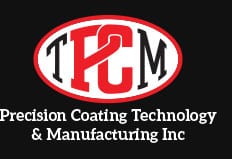The Top Plastisol Coating Benefits

While plastisol may be most commonly encountered as a textile ink on t-shirts and other clothing items, its use as a metal coating is much more wide-ranging and significant. Here at Precision Coating Technology & Manufacturing (PCTM), we provide plastisol coatings for clients in an amazingly diverse array of industries, from railway manufacturing through military defense.
Indeed, plastisol’s soft, color-matched finish and superior resistance to corrosion make it just as valuable as a protective finish on the racks inside your dishwasher as for military vehicle hardware on the battlefield overseas.
Today’s post offers a closer look at this unique material, its advantages, and how we apply it to guarantee years of durable performance.
What is Plastisol and how is it applied?
As we introduced in our previous blog post about coatings in the defense industry, plastisol is liquid vinyl—a unique formulation of PVC (polyvinyl chloride) particles within a plasticizer. Once it is heat cured, plastisol is soft to the touch yet very strong, which makes it a fantastic coating choice for tool handles and grips, as well as a variety of other applications—especially on metals regularly exposed to the elements outdoors. Additionally, plastisol provides excellent abrasion and corrosion resistance and is flame retardant.
While there are two accepted ways to apply plastisol as a coating—dip coating and spray coating—it’s true that dip coating achieves the most consistent results and has several other advantages, as well. That’s why we only dip coat plastisol here at PCTM.
Dip Coating (and why this method is best)
Plastisol coating is applied by dipping the base object, which has been adequately heated, into a tank containing the plastisol liquid. Multiple dips can achieve varied coating thicknesses—typically between 1/16″ to 1/4” thick.
Dip coating plastisol eliminates the need to “deburr” base materials. When a substrate is properly primed and heated before dipping, it allows the plastisol to cover and fill surface imperfections commonly found with castings. Similarly, unusually shaped parts can be most evenly coated by dipping, especially when more than one coat is applied.
Most common applications
It’s true that plastisol dip coatings are appropriate for a wide range of both everyday household items, as well as parts and components with much more exotic uses. Here at PCTM, we’re capable of meeting the most demanding customer specifications for plastisol coatings, whether you have a handful of large items to be coated or thousands of small machine parts.
Hardware and handles for military vehicles
Plastisol became important to the defense industry during World War II when it was found to be a great replacement for natural rubber as wire insulation on ships. It also served as a protective coating on plane and vehicle shock absorbers and made its debut as a tool handle covering during those years.
Today, plastisol coatings are particularly useful in protecting hardware for military vehicles. Many of our defense customers here at PCTM choose the specification A-A-59464 (formerly spec MIL-P-20689), though our precise application procedure means that we can work with other specifications, as well.
Tool handles and latches
Did you know that the natural oils on your hands can etch bare metal, which causes damage and wear over time? Additionally, tools and fasteners, which are meant to be handled, provide a much better user experience when they’re coated with a substance like plastisol that offers better grip and a softer feel.
Small automotive fasteners and other car parts
Although history isn’t clear, plastisol may have gotten its start in the expanding automotive industry before World War II. It proved to be an excellent replacement for natural rubber in many applications, and plastisol is still used as a coating on a variety of automotive parts.
Small animal cages
Small animals like rabbits and rodents that we enjoy keeping as pets need safe and easily cleanable living quarters. Plastisol coating makes the metal mesh used in caging materials much more comfortable, resistant to damage from chewing, and less likely to corrode.
Dishwasher racks
Commercial dishwashers found in restaurants and cafeterias, as well as your dishwasher at home, require racks and other interior components that can withstand extreme heat and moisture without rusting or breaking down. Plastisol is the perfect match for these hardworking parts.
Need plastisol or other coatings? PCTM is ready to help you reach your project goals!
If you have a project that requires plastisol or other expertly applied coatings, we want to talk with you about your needs. Whether you’re searching for the best industrial coatings for extreme temperature resistance, or you need to meet precise military specifications, PCTM has the knowledge and experience to help you reach your goals. Contact us today to learn more.

